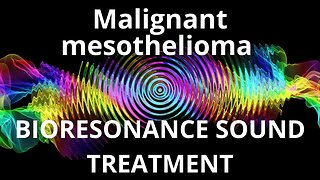Premium Only Content

Tuberous Sclerosis_Sound therapy session_Sounds of nature
#resonantfrequency #soundtherapy #adjunctivetreatment #TuberousSclerosis #conventionalmedicine #health #wellness #integrativemedicine #holisticapproach #medicalresearch
Tuberous Sclerosis (TS) is a complex genetic disorder that can impact various organs, including the brain, skin, kidneys, and heart. While conventional medicine plays a vital role in managing TS, there is growing interest in exploring alternative therapies that can complement traditional treatments. Resonant frequency sound therapy is emerging as a promising adjunctive treatment for TS, harnessing the power of sound vibrations to enhance the effectiveness of conventional medicine. In this article, we will delve into the benefits of using resonant frequency sound therapy alongside conventional medicine for the treatment of Tuberous Sclerosis.
TS is characterized by the growth of noncancerous tumors in various organs, causing a range of symptoms such as seizures, cognitive impairment, skin abnormalities, and organ dysfunction. Managing TS requires a multidisciplinary approach, and alternative therapies like sound therapy can complement conventional treatments.
Resonant frequency sound therapy operates on the principle that sound vibrations can influence the body and promote healing. By exposing individuals to specific frequencies, sound therapy aims to restore balance and harmony within the body, potentially alleviating symptoms associated with Tuberous Sclerosis.
One of the primary benefits of resonant frequency sound therapy for TS is its potential impact on neurological symptoms. Sound therapy can help regulate brain activity, reduce seizures, and improve cognitive function. By working alongside conventional medications and interventions, it offers a holistic approach to managing TS-related neurological challenges.
Tuberous Sclerosis can impact emotional and mental well-being due to the stress and challenges associated with the condition. Resonant frequency sound therapy can provide a sense of relaxation, reduce anxiety, and improve overall emotional well-being. As an adjunctive treatment, it contributes to a comprehensive approach for enhancing mental health in individuals with TS.
Sound therapy can also play a role in managing physical symptoms of Tuberous Sclerosis. It may help alleviate pain, reduce muscle spasms, and promote relaxation in affected organs. By combining resonant frequency sound therapy with conventional interventions, individuals with TS can experience enhanced symptom management and improved quality of life.
Research suggests that sound therapy can stimulate the immune system and promote its optimal functioning. This immune support can be beneficial for individuals with Tuberous Sclerosis, as it may help in preventing infections and supporting overall health.
Conclusion:
Resonant frequency sound therapy holds promise as an adjunctive treatment for Tuberous Sclerosis when combined with conventional medicine. Its potential to positively impact neurological symptoms, emotional well-being, physical symptom management, and immune system support makes it a valuable addition to the treatment toolbox for TS.
TO ACHIEVE A POSITIVE RESULT, DAILY LISTENING TO VIDEOS IS REQUIRED.
In my store you can purchase unique medicines:
https://store11998180.company.site/
You have the opportunity to support the channel:
https://destream.net/live/RadSiarAl/donate
-
 30:00
30:00
BIORESONANCE SOUND THERAPY
1 month agoMalignant mesothelioma _ Sound therapy session _ Sounds of nature
1191 -
 LIVE
LIVE
Robert Gouveia
1 hour ago'Missing Minute' is GONE! New IMMUNITY Demands! Obama's PLOT! Schiff in TROUBLE!
625 watching -
 11:35
11:35
Tactical Advisor
2 days agoAnother Sig Trigger Fail | P320 P365 and X Macro
35 -
 7:34
7:34
Michael Button
8 hours ago $0.01 earnedWhy I Left Academia to Explore Lost Civilizations
1332 -
 1:01:58
1:01:58
Sarah Westall
1 hour agoNEW STUDY RESULTS: Humans have MAC ID Chips – How Did They Get There? w/ Hazen and Mansfield
2.89K4 -
 2:03:53
2:03:53
Pop Culture Crisis
4 hours agoBillie Eilish & Sydney Sweeney Blamed For 'Whiteness', Millennials WORRIED About Gen Z | Ep. 887
18K11 -
 2:19:34
2:19:34
ZiggySalvation
3 hours agoCoD HC Time
1.7K -
 LIVE
LIVE
Spartan
2 hours agoSpartan - Pro Halo Player for OMiT | Scrims vs C9, Maybe Ranked after
54 watching -
 3:35:14
3:35:14
Due Dissidence
7 hours agoNetanyahu DENIES Gaza Starvation, Chris Smalls ASSAULTED in IDF Custody, MTG RIPS Randy Fine
6.01K10 -
 1:13:40
1:13:40
vivafrei
4 hours agoFire This Police Chief! Mass Shooting in New York! Sean Feucht Smoke Bomb Suspect ON VIDEO & MORE!
89K51